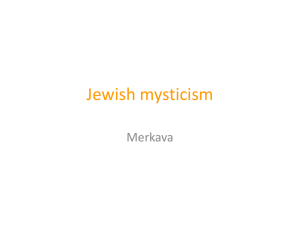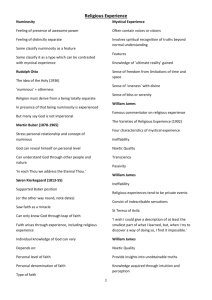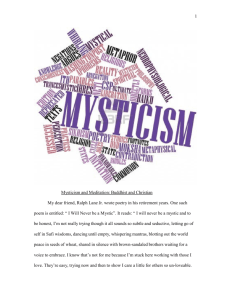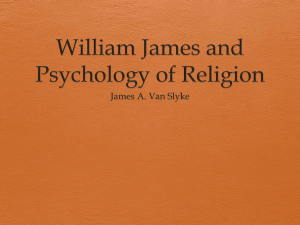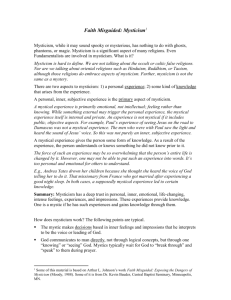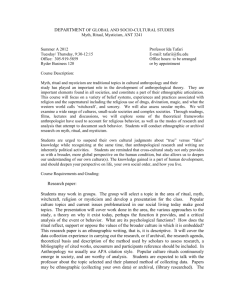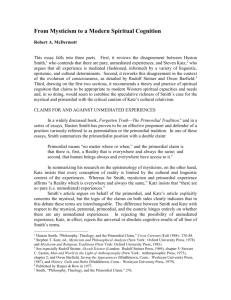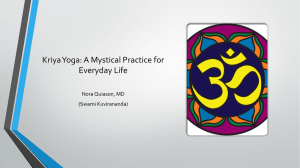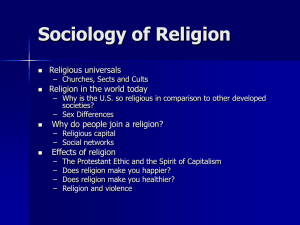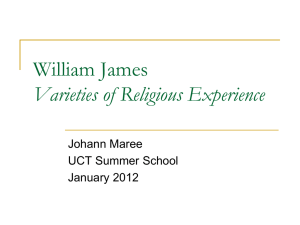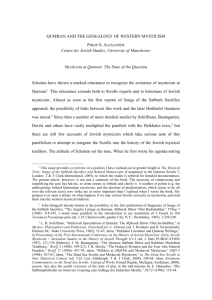Word - Pegasus @ UCF - University of Central Florida
advertisement
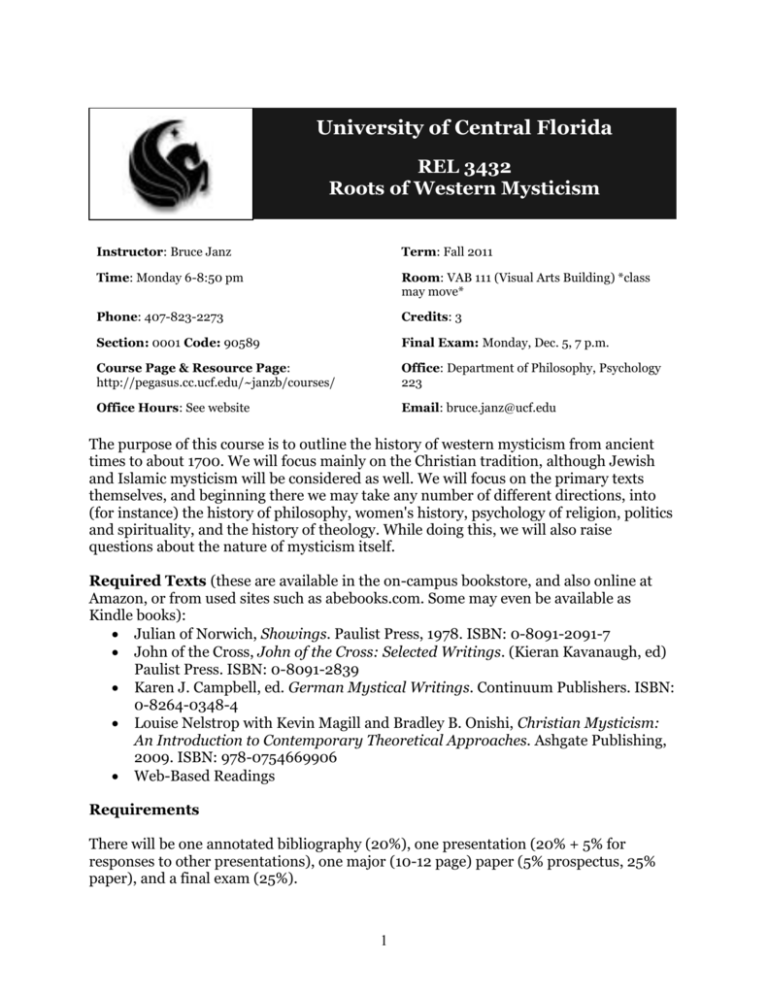
University of Central Florida REL 3432 Roots of Western Mysticism Instructor: Bruce Janz Term: Fall 2011 Time: Monday 6-8:50 pm Room: VAB 111 (Visual Arts Building) *class may move* Phone: 407-823-2273 Credits: 3 Section: 0001 Code: 90589 Final Exam: Monday, Dec. 5, 7 p.m. Course Page & Resource Page: http://pegasus.cc.ucf.edu/~janzb/courses/ Office: Department of Philosophy, Psychology 223 Office Hours: See website Email: bruce.janz@ucf.edu The purpose of this course is to outline the history of western mysticism from ancient times to about 1700. We will focus mainly on the Christian tradition, although Jewish and Islamic mysticism will be considered as well. We will focus on the primary texts themselves, and beginning there we may take any number of different directions, into (for instance) the history of philosophy, women's history, psychology of religion, politics and spirituality, and the history of theology. While doing this, we will also raise questions about the nature of mysticism itself. Required Texts (these are available in the on-campus bookstore, and also online at Amazon, or from used sites such as abebooks.com. Some may even be available as Kindle books): Julian of Norwich, Showings. Paulist Press, 1978. ISBN: 0-8091-2091-7 John of the Cross, John of the Cross: Selected Writings. (Kieran Kavanaugh, ed) Paulist Press. ISBN: 0-8091-2839 Karen J. Campbell, ed. German Mystical Writings. Continuum Publishers. ISBN: 0-8264-0348-4 Louise Nelstrop with Kevin Magill and Bradley B. Onishi, Christian Mysticism: An Introduction to Contemporary Theoretical Approaches. Ashgate Publishing, 2009. ISBN: 978-0754669906 Web-Based Readings Requirements There will be one annotated bibliography (20%), one presentation (20% + 5% for responses to other presentations), one major (10-12 page) paper (5% prospectus, 25% paper), and a final exam (25%). 1 Readings: All readings must be done for the beginning of the week they are assigned. They are considered part of the course requirements, and you will be tested on them at the end of the course. Please bring the readings to class, as we will regularly be referring to them (and in most cases, working through them in class). Course Wiki: There is a wiki that we will use, located at http://srs09-2.pbworks.com/ I will sign up everyone by their Knightsmail addresses. Several assignments will be uploaded to the wiki, as noted below. For working with the wiki, please see this page. Presentation (20%, Due in different weeks, depending on the sign-up schedule + 5% for responses, 1% for each response submitted): Each student is responsible for leading one discussion during the term. The schedule will be determined early in the term. This presentation will involve summarizing and clarifying the week’s assigned readings for the class (i.e., giving the rest of the group a sense of what the writer is trying to say, and placing the writer in the context of previous readings), and coming up with discussion questions that can lead the seminar group, and contribute to the entire class. Students will be expected to go past the paper or papers that were assigned, to look at other scholarly work that will help to contextualize, understand, or critique the material in question. A handout will be required, which summarizes the presentation. Please see “How to Lead a Seminar” on the courses page for more information on this. There are more weeks for presentations than there will be people in the groups (see below for presentation dates), and so in weeks where there is no one to lead the discussion, the group itself will work through the readings together. Presentations will typically occur in the first hour of the class. Other students in the seminar groups will provide written responses on the seminar, and you will have to put your handouts up on the wiki as well. The responses from others in the group will consist of both an assessment of the presentation style and comprehensiveness itself, and also a response to the positions in the week’s readings. There will be forms available for this. The 5% grade is based on the total number of responses in each subgroup over the term. Annotated Bibliography\Literature Review: (20%, due Oct. 17, uploaded to the wiki) Each person will prepare an annotated bibliography of at least 20 items (more is fine, too). The bibliography must have a focus on a person, movement, concept, or issue within the history or philosophy of mysticism. By "annotated", I mean that you should provide a short (2-3 sentence) description of what the work is about, and how it is relevant to the theme of the bibliography. You will need to clear the focus of the bibliography with me. The intention is that this bibliography will support your major paper. This assignment will be uploaded to the wiki. Major Paper: (prospectus (5%) + paper (25%). Prospectus due: Oct. 31, uploaded to the wiki; Paper due: Nov. 28, emailed or handed in to me. Paper length: 2500 words) I would like to see a critical analysis of some issue in the philosophy of mysticism. You can focus on an issue in a particular thinker's work (e.g., the notion of non-being in Eckhart), or you can consider the issue in itself (e.g., to what extent is Katz's contextualism an 2 adequate way of understanding mystical experience?). You may also consider a thinker not addressed in this course, as long as that thinker has something interesting to say about a relevant issue. It is also possible to do a phenomenological examination of some aspect of experience, but if you do that, you need to use a clear and recognized phenomenological method, with references. I can suggest possible topics, for those that need some ideas. NOTE: I am looking for more than just an account of a theory. I would like to see that you've thought it through, and can interact with the thinker or the position. Topics will be suggested in class or here on the website, but you are encouraged to come up with a topic yourself. For more on prospecti, see “How to Write a Prospectus” on the courses page. Final Exam: (30%) Dec. 7, 10 a.m. – 12:50 p.m. in the course room. Gordon Rule: This is a Gordon Rule course. That means that there are at least four graded written assignments. The four assignments that fulfill this requirement are indicated by an asterisk above. If an exam is indicated, it means that there will be a substantial essay question on the exam. If you miss one of the assignments, the most you will get in the course is a C-, since a higher grade indicates fulfillment of the Gordon Rule Requirement. Please plan accordingly. Grade Distribution: I will record the assignment grades based on the percentage of the course grade during the term (for example, an assignment will be recorded as a grade out of 20 if it is worth 20% of the course grade, although it may be marked out of another number). The letter grade will be calculated only at the end of the course, based on full course grade. The distribution will be as follows: A: 93-100 A-: 90-92 B+: 87-89 B: 83-86 B-: 80-82 C+: 77-79 C: 73-76 C-: 70-72 D+: 67-69 D: 63-66 D-: 60-62 F: 0-59 IMPORTANT: For further details on this course, please see “The Fine Print”, at http://pegasus.cc.ucf.edu/~janzb/courses/fineprint.htm That document is considered part of the syllabus for this course. 3 Schedule: Roots of Western Mysticism 1 2 3 4 5 6 7 8 CM: Nelstrop et al, Christian Mysticism JN: Julian of Norwich, Showings JC: John of the Cross, Selected Writings GMW: Karen Campbell, ed., German Mystical Writings In some cases, the readings will be available online. Please check the online version of the syllabus or the reading schedule to access them. Date Pres Topic Readings Aug 22 Introduction; Theories and CM: Introduction History of Mysticism Some Accounts of Mystical Experience. Experience Mystical Experience Registry Mystical Experiences of Famous People Mystical Experiences of Regular People Aug 29 Early Mysticism; Greece CM: 1 and Jerusalem; Plotinus. Parmenides, On Nature. Plato, Phaedrus excerpt. Plato, Cave Allegory. Plotinus, Enneads: On Beauty, On The Good or the One Sep 12 Early Christian Theology: CM: 2, 3, 5 The Roots of Catholic and Augustine, Confessions, On Orthodox Mysticism. the Trinity Augustine, Cappadocians, Dionysus, The Mystical (Pseudo-) Dionysius, John Theology. Scotus Eriugena. Sep 19 * Early Medieval Mysticism: CM 7, 8 Monasticism, Hildegard of GMW Hildegard Bingen. Sep 26 * Love Mysticism: Bernard of CM 4 Clairvaux, Mechthild of GMW Mechthild Magdeburg. Bernard of Clairvaux Oct 3 The Roots of Esoteric Merkabah Texts Traditions; Jewish Jewish Mysticism, Mysticism; Gnosticism. What is a Gnostic? The Gnostic World View Oct 10 * Mediaeval English CM 9 Mysticism I: Julian of JN 173-247 Norwich. Oct 17 * Mediaeval English JN 248-343 Mysticism II: Julian of 4 9 Norwich. Speculative Mysticism: Meister Eckhart I Oct 24 * 10 Oct 31 * Speculative Mysticism: Meister Eckhart II 11 * The Roots of Protestant Mysticism: Eckhart, Seuse, Tauler, Theologica Germanica, Martin Luther. The Beginnings of Modern Mysticism: Jacob Boehme, Silesius, Nicholas of Cusa Nov 7 12 Nov 14 13 Nov 21 14 Nov 28 15 Dec 5 * Spanish Mysticism: Theresa of Avila, John of the Cross. Mysticism after early modernism; Epilogue; Review Final Exam 5 CM 10 GMW Eckhart: "Talks of Instruction", "About Disinterest", Sermons 1, 3, 4 CM 11 GMW Eckhart: Rest of Sermons, Granum Sinapis CM 12 GMW Seuse, Tauler, Theological Germanica GMW Boehme Boehme, Mysterium Magnum excerpt, Boehme, Signature Rerum excerpt. Boehme, Mysterium Pansophicum JC Dark Night of the Soul. Why Studying Mysticism is a Really Bad Idea.
